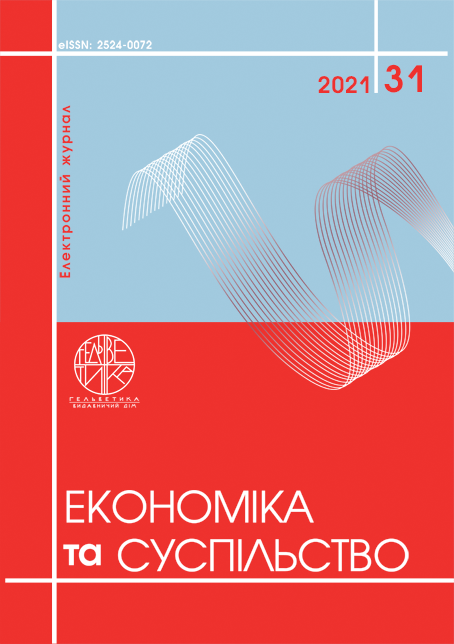TOURISM INDUSTRY SAFETY MANAGEMENT IN CONDITIONS OF COVID-19 PANDEMIC
Abstract
Problems of tourism safety management have been considered in the paper. An important place in economic system of the state belongs to the tourism industry. Tourism is a complex socio-economic system that has a complex impact on economic development. It is established that the impact of tourism is manifested by spread of certain economic and socio-cultural benefits that arise in various activities and spread to different areas. Tourism industry development contributes to the development of tourist areas, increasing the number of trips, improving people life quality, socio-cultural development of population, increasing revenues to local budgets. It has been determined that the concept of "tourism safety" is a complex and multifaceted concept. "Tourism safety" includes personal security of tourist, security of doing business in tourism sector, security of the state in which tourist services are provided. Threats to the safety of tourist include threats to the violation of constitutional rights and freedoms of tourist, harm to life and health, damage or loss of property, improper performance of their duties by the tour operator. Among the threats to security of doing business in tourism industry are the following: the lack of favorable conditions for doing business, business risk, the action of unforeseen factors. Threats to the security of the state in which tourist services are provided are the following: violation of nature management conditions in the field of tourism, destruction of tourist sites and damage to cultural heritage, committing crimes in the state, exploitation of local tourism industry, threats of emergencies both natural and man-made origin and others. An analysis of COVID-19 pandemic impact on development of tourism industry has been conducted. It has been established that the pandemic caused a reduction in the volume of tourist services provided in Ukraine by 44.2% in 2020 and redistribution of revenues from the provision of tourist services in favor of domestic tourists. Measures of tourism industry safety management in pandemic conditions have been developed.
References
Candela G., Figini N. The economics of tourism destinations. New York: Springer, 2012. 616 p.
Маловичко С.В., Барабанова В.В. Трансформаційна система послуг туристичної сфери: виклики сьогодення. ВІСНИК ДонНУЕТ. 2020. № 1(72). С. 66–74. DOI: https://doi.org/10.33274/2079-4819-2020-72-1-66-74
Звіти про економічний вплив. URL: https://wttc.org/Research/Economic-Impact
Вплив COVID-19 та карантинних обмежень на економіку України. URL: https://www.kas.de/documents/270026/2020.pdf/
Travel & Tourism. Global Economic Impact and Trends 2021. URL: https://wttc.org/Portals/0/Documents/Reports/2021/Global
Кулиняк І.Я., Жигало І.І., Ярмола К.М. Туристична галузь в умовах пандемії COVID-19: тенденції та заходи підтримання. БІЗНЕСІНФОРМ. 2021. № 1. С. 177–184. DOI: https://doi.org/10.32983/2222-4459-2021-1-177-184
Candela G. & Figini N. (2012) The economics of tourism destinations. New York: Springer.
Malovychko S.V. & Barabanova V.V. (2020) Transformatsiina systema posluh turystychnoi sfery: vyklyky sohodennia. [Transformational system of services in the tourism sector: the challenges of today]. VISNYK DonNUET. № 1(72). S. 66–74. DOI: https://doi.org/10.33274/2079-4819-2020-72-1-66-74 (in Ukrainian)
Zvity pro ekonomichnyi vplyv. [Reports on economic impact]. Retrieved from: https://wttc.org/Research/Economic-Impact
Vplyv COVID-19 ta karantynnykh obmezhen na ekonomiku Ukrainy. [Impact of COVID-19 and quarantine restrictions on the economy of Ukraine]. Retrieved from: https://www.kas.de/documents/270026/2020.pdf/ (in Ukrainian)
Travel & Tourism. Global Economic Impact and Trends 2021. Retrieved from: https://wttc.org/Portals/0/Documents/Reports/2021/Global
Kulyniak I. Ya., Zhyhalo I. I. &Yarmola K. M. (2021) Turystychna haluz v umovakh pandemii COVID-19: tendentsii ta zakhody pidtrymannia. [Tourism industry in the context of the COVID-19 pandemic: trends and measures]. BIZNESINFORM. № 1. P. 177–184. DOI: https://doi.org/10.32983/2222-4459-2021-1-177-184 (in Ukrainian)


